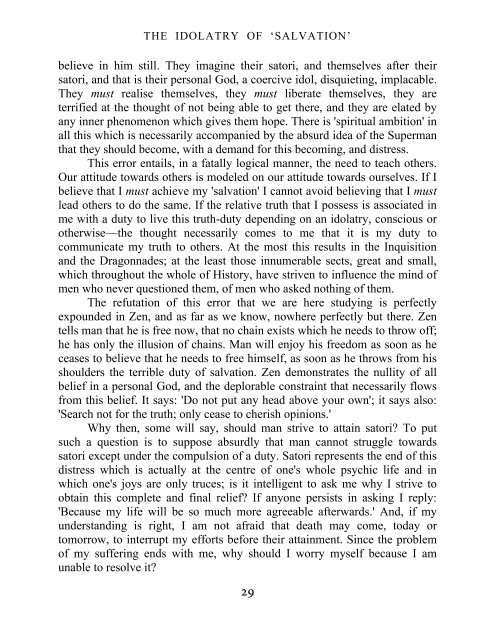The Supreme Doctrine - neo-alchemist
The Supreme Doctrine - neo-alchemist
The Supreme Doctrine - neo-alchemist
You also want an ePaper? Increase the reach of your titles
YUMPU automatically turns print PDFs into web optimized ePapers that Google loves.
THE IDOLATRY OF ‘SALVATION’<br />
believe in him still. <strong>The</strong>y imagine their satori, and themselves after their<br />
satori, and that is their personal God, a coercive idol, disquieting, implacable.<br />
<strong>The</strong>y must realise themselves, they must liberate themselves, they are<br />
terrified at the thought of not being able to get there, and they are elated by<br />
any inner phenomenon which gives them hope. <strong>The</strong>re is 'spiritual ambition' in<br />
all this which is necessarily accompanied by the absurd idea of the Superman<br />
that they should become, with a demand for this becoming, and distress.<br />
This error entails, in a fatally logical manner, the need to teach others.<br />
Our attitude towards others is modeled on our attitude towards ourselves. If I<br />
believe that I must achieve my 'salvation' I cannot avoid believing that I must<br />
lead others to do the same. If the relative truth that I possess is associated in<br />
me with a duty to live this truth-duty depending on an idolatry, conscious or<br />
otherwise—the thought necessarily comes to me that it is my duty to<br />
communicate my truth to others. At the most this results in the Inquisition<br />
and the Dragonnades; at the least those innumerable sects, great and small,<br />
which throughout the whole of History, have striven to influence the mind of<br />
men who never questioned them, of men who asked nothing of them.<br />
<strong>The</strong> refutation of this error that we are here studying is perfectly<br />
expounded in Zen, and as far as we know, nowhere perfectly but there. Zen<br />
tells man that he is free now, that no chain exists which he needs to throw off;<br />
he has only the illusion of chains. Man will enjoy his freedom as soon as he<br />
ceases to believe that he needs to free himself, as soon as he throws from his<br />
shoulders the terrible duty of salvation. Zen demonstrates the nullity of all<br />
belief in a personal God, and the deplorable constraint that necessarily flows<br />
from this belief. It says: 'Do not put any head above your own'; it says also:<br />
'Search not for the truth; only cease to cherish opinions.'<br />
Why then, some will say, should man strive to attain satori? To put<br />
such a question is to suppose absurdly that man cannot struggle towards<br />
satori except under the compulsion of a duty. Satori represents the end of this<br />
distress which is actually at the centre of one's whole psychic life and in<br />
which one's joys are only truces; is it intelligent to ask me why I strive to<br />
obtain this complete and final relief? If anyone persists in asking I reply:<br />
'Because my life will be so much more agreeable afterwards.' And, if my<br />
understanding is right, I am not afraid that death may come, today or<br />
tomorrow, to interrupt my efforts before their attainment. Since the problem<br />
of my suffering ends with me, why should I worry myself because I am<br />
unable to resolve it?<br />
29




